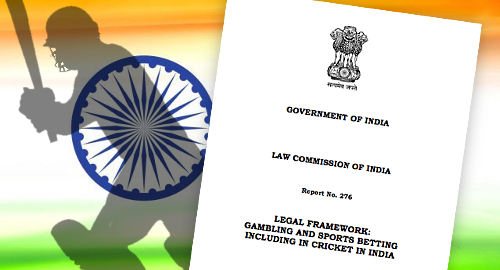 India should legalize sports betting and gambling to raise badly needed government revenue and reduce problem gambling behavior, according to a new legal report.
India should legalize sports betting and gambling to raise badly needed government revenue and reduce problem gambling behavior, according to a new legal report.
Over two years ago, the Law Commission of India (LCI) was tasked with examining the best way to deal with the country’s rampant gambling activity, nearly all of which remained underground and untaxed. India’s archaic gambling laws date back to 1867, when the country was still an English colony.
On Thursday, after much public and stakeholder input, the LCI released its report, Legal Framework: Gambling and Sports Betting including Cricket in India, which notes that India has fought a largely losing battle against illegal gambling operators. “Since it is not possible to prevent these activities completely, effectively regulating them remains the only viable option.”
The LCI believes that India’s constitution already empowers the national parliament to remedy the situation, and the LCI urges parliament to enact laws that would allow individual states the right to opt out of legal gambling within their respective borders.
India’s gambling laws already permit exceptions for so-called ‘skill-centric’ gambling, i.e. horseracing, and the LCI recommends that “other skill-centric games” should be granted similar exemptions.
The LCI suggests that the government impose a variety of restrictions to limit problem gambling activity and money laundering, including requiring all transactions between players and operators to be “cashless.” All transactions would be linked to players’ Aadhaar demographic ID numbers and their tax-based Permanent Account Number (PAN).
Gambling would be classified under two categories, ‘proper’ and ‘small’ gambling, with ‘proper’ referring to higher gambling stakes. Only individuals whose income eclipses certain thresholds would be allowed to engage in ‘proper’ gambling. Individuals receiving social assistance from the government or whose income falls below the minimum threshold for taxation would be barred from all legal gambling.
The LCI further recommends that upper limits for gambling deposits, winnings and losses be mandatory. There would also be limits on the number of allowable gambling transactions during specific periods, i.e. monthly or yearly, that would depend on an individual’s personal financial circumstances.
The LCI also recommends that only “Indian-licensed operators from India” be permitted to offer legal gambling, although it also claims that laws should be amended to “encourage Foreign Direct Investment in the casino/online gaming industry, lawfully permitting technological collaborations, licensing and brand sharing agreements, etc.”
Indian-licensed online gambling websites would be required to prominently display responsible gambling information and to ensure that no “objectionable or pornographic content” is displayed on their portals.
The report notes that information technology laws may need to be amended to ensure that technical intermediaries aren’t prosecuted for transmitting or hosting content related to legal gambling.
The report stressed the significant contributions that legal gambling could make toward governmental tax coffers, and recommended that this windfall be used to fund public welfare initiatives. Authorizing land-based casinos would also lead to a surge in local employment and growth in tourism.
The report comes hot on the heels of a major celebrity-driven illegal cricket betting crackdown but it remains to be seen how India’s socially conservative legislators will greet the LCI’s report, and whether prohibitionist instincts will continue to triumph over logic and reality.